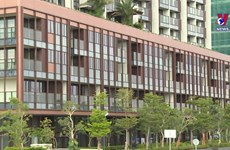Auto industry group calls on ministry to hold line on taxes
Despite the surge in domestic demand,
the Vietnam Automobile Manufacturers Association (VAMA) is urging the
Ministry of Industry and Trade to maintain current tax and fee rates.
Despite the surge in domestic demand,
the Vietnam Automobile Manufacturers Association (VAMA) is urging the
Ministry of Industry and Trade to maintain current tax and fee rates.
VAMA predicted sales would be the same or slightly higher than in 2009, if the preferential tax policies were extended until the end of next year.
According to VAMA chairman Akito Tachibana, the organisation would not be able to accurately predict auto consumption for the country’s next fiscal year due to the fluctuation of the economy, tax policies and customer sentiment.
If tax incentives were ineffective late this year, the auto market would slow down further as car prices surge again.
Vietnam will have to continue the next steps of the Agreement on the Common Effective Preferential Tariffs (CEPT) for the ASEAN Free Trade Area. Under the agreement, the country will reduce tariffs on cars imported from Southeast Asian nations by 60 percent in 2013 and then to zero percent in 2018.
From late 2008 to early 2009, the automobile market was hit hard by the global economic downturn. From January to April of this year, sales of automobile makers in Vietnam were quite modest.
The government sought to stimulate the economy by cutting 50 percent of value-added tax in February and slashing 50 percent of the registration fee last May.
Figures show that the automobile manufacturing and assembling market has yet to recover, the association said. VAMA sales in July still dropped by 25 percent from the previous year.
Higher special consumption tax from April and the domestic content ratio for six-to-nine seat cars has also had a negative impact on local production.
VAMA also predicts that the auto market for the remainder of the year will be boisterous.
The prediction are attributed to the clients’ likely desire to take advantage of the tax incentives before the policy’s expiration in late December, thus causing an increase in sales toward the end of the year.
Meanwhile, car makes are unable to meet the rising demand of domestic clients. Factors, such as lengthy waiting periods for spare parts, have made domestic cars less favoured by clients. Clients’ willingness to buy imported cars has helped to increase the country’s trade deficit.
Because of the strong competition from imported cars, VAMA predicts that consumption this year will be the same or lower than that in 2008, which was estimated to be between 110,000 and 120,000 domestically-produced cars.
In an effort to avoid a further decrease in sales, VAMA has officially asked authorised agencies to re-schedule the value added tax and registration fee until the end of 2010.
The Ministry of Industry and Trade forecasts Vietnam auto market to boom in 2015 with 166,000 to 235,000 units sold and an expected yearly growth rate of 17 percent./.
VAMA predicted sales would be the same or slightly higher than in 2009, if the preferential tax policies were extended until the end of next year.
According to VAMA chairman Akito Tachibana, the organisation would not be able to accurately predict auto consumption for the country’s next fiscal year due to the fluctuation of the economy, tax policies and customer sentiment.
If tax incentives were ineffective late this year, the auto market would slow down further as car prices surge again.
Vietnam will have to continue the next steps of the Agreement on the Common Effective Preferential Tariffs (CEPT) for the ASEAN Free Trade Area. Under the agreement, the country will reduce tariffs on cars imported from Southeast Asian nations by 60 percent in 2013 and then to zero percent in 2018.
From late 2008 to early 2009, the automobile market was hit hard by the global economic downturn. From January to April of this year, sales of automobile makers in Vietnam were quite modest.
The government sought to stimulate the economy by cutting 50 percent of value-added tax in February and slashing 50 percent of the registration fee last May.
Figures show that the automobile manufacturing and assembling market has yet to recover, the association said. VAMA sales in July still dropped by 25 percent from the previous year.
Higher special consumption tax from April and the domestic content ratio for six-to-nine seat cars has also had a negative impact on local production.
VAMA also predicts that the auto market for the remainder of the year will be boisterous.
The prediction are attributed to the clients’ likely desire to take advantage of the tax incentives before the policy’s expiration in late December, thus causing an increase in sales toward the end of the year.
Meanwhile, car makes are unable to meet the rising demand of domestic clients. Factors, such as lengthy waiting periods for spare parts, have made domestic cars less favoured by clients. Clients’ willingness to buy imported cars has helped to increase the country’s trade deficit.
Because of the strong competition from imported cars, VAMA predicts that consumption this year will be the same or lower than that in 2008, which was estimated to be between 110,000 and 120,000 domestically-produced cars.
In an effort to avoid a further decrease in sales, VAMA has officially asked authorised agencies to re-schedule the value added tax and registration fee until the end of 2010.
The Ministry of Industry and Trade forecasts Vietnam auto market to boom in 2015 with 166,000 to 235,000 units sold and an expected yearly growth rate of 17 percent./.













